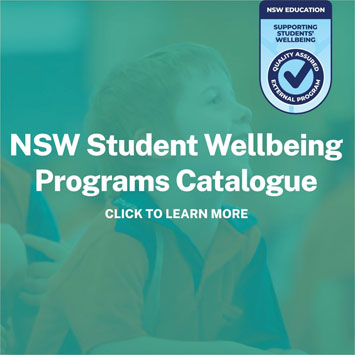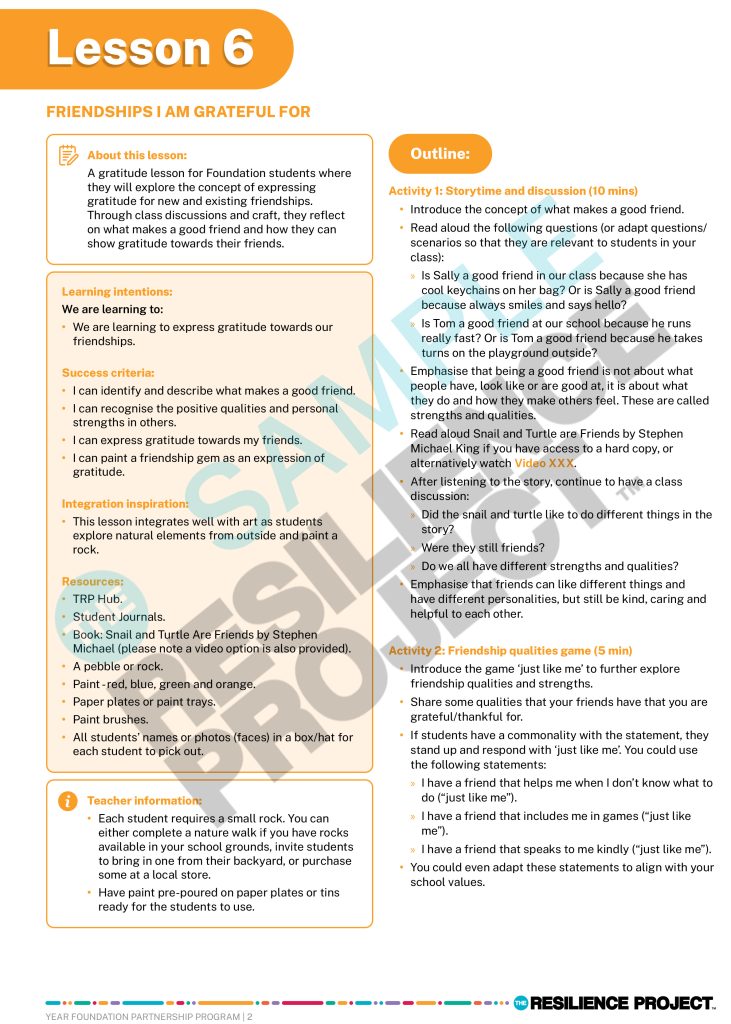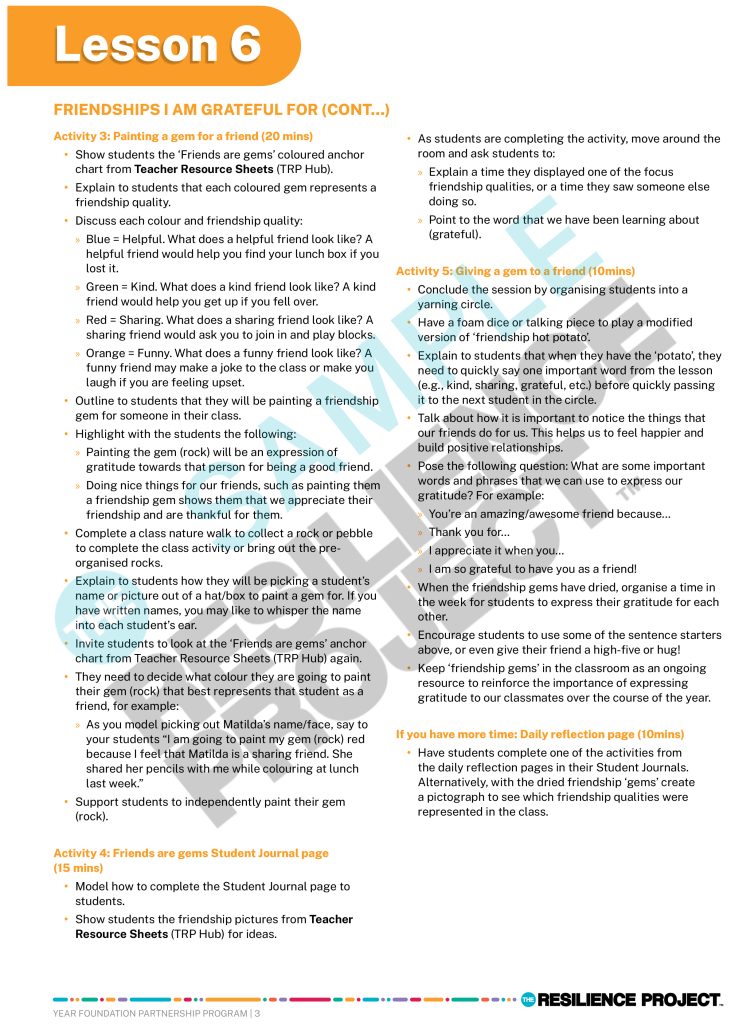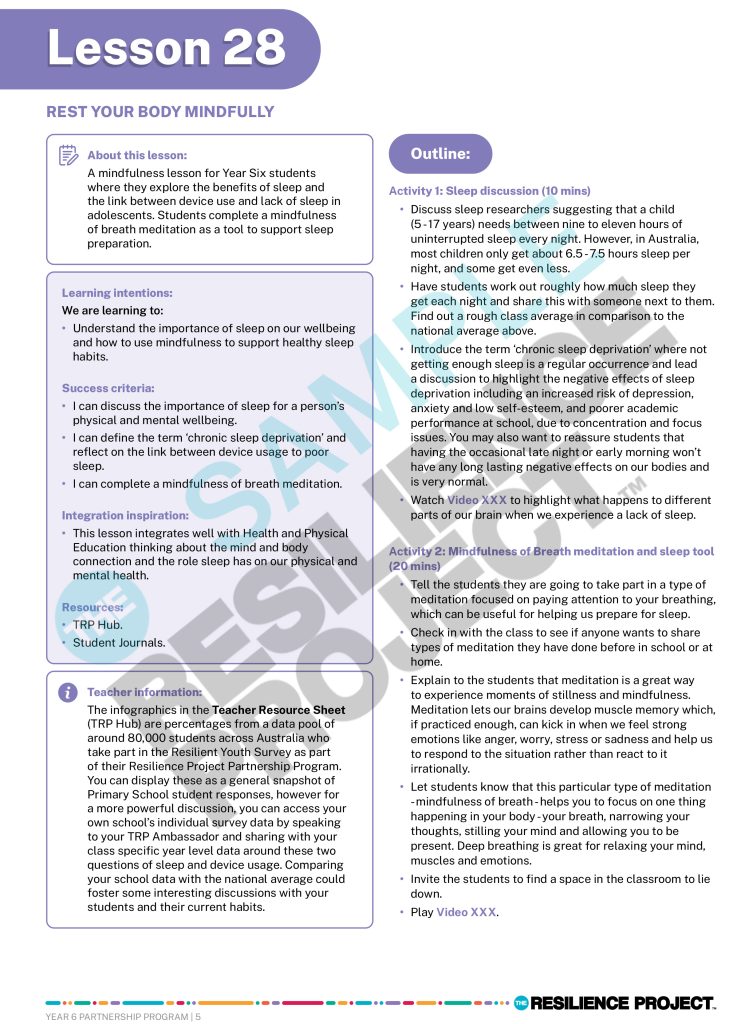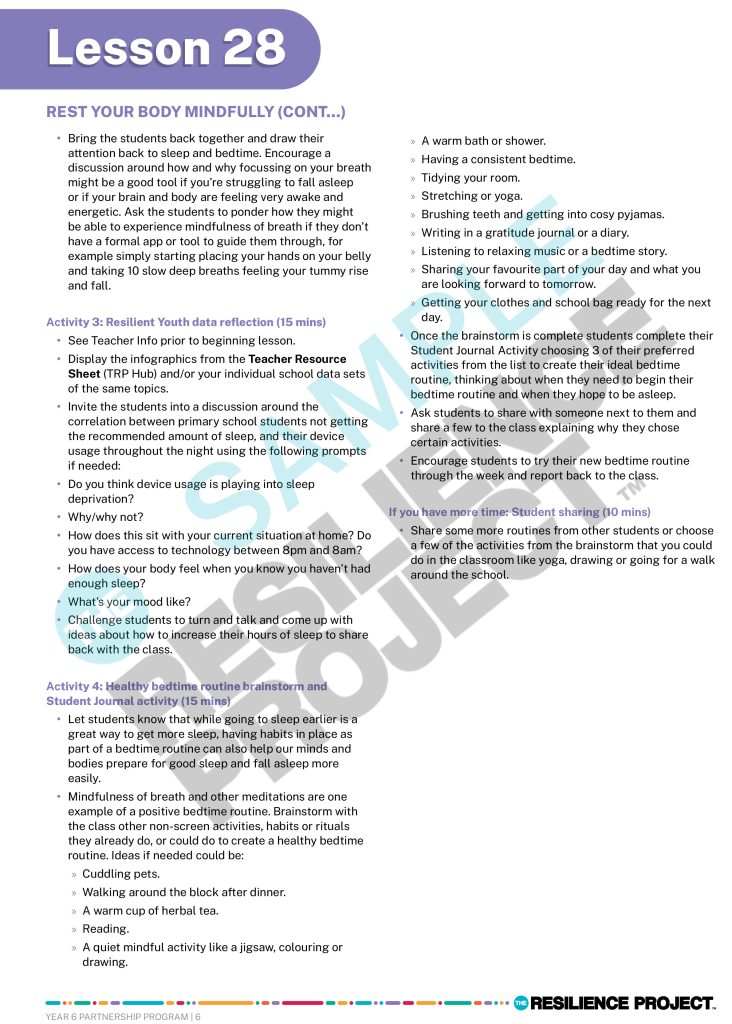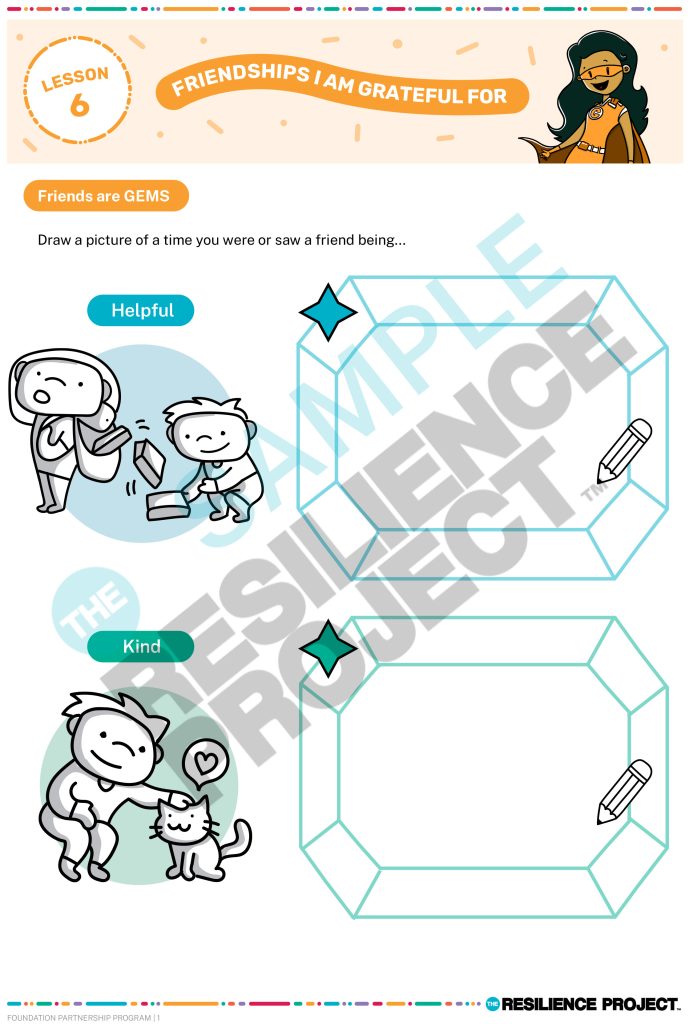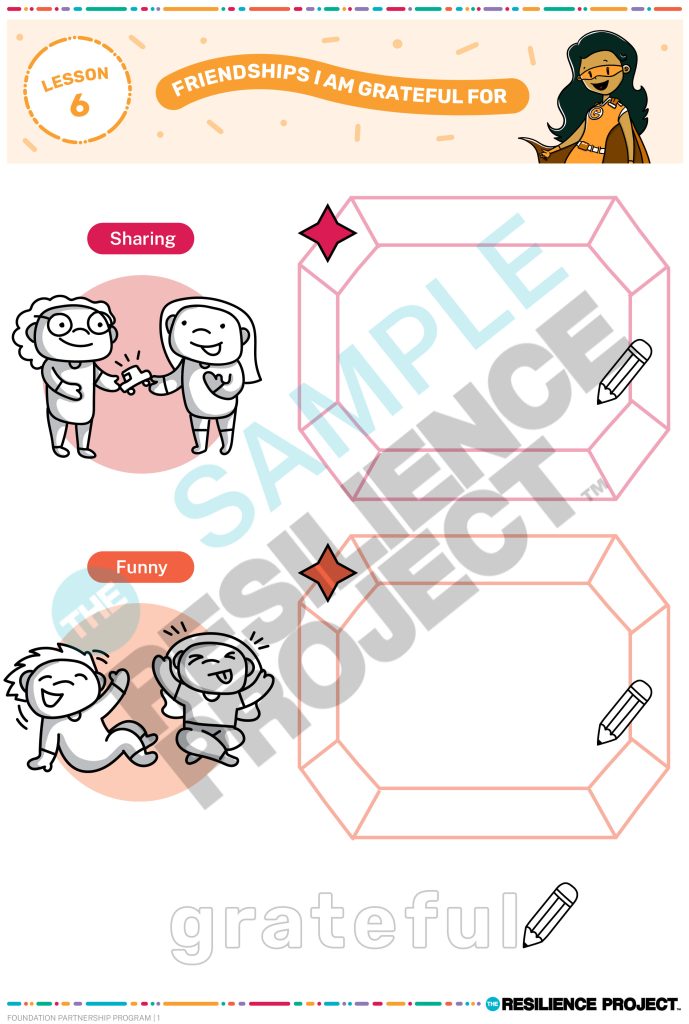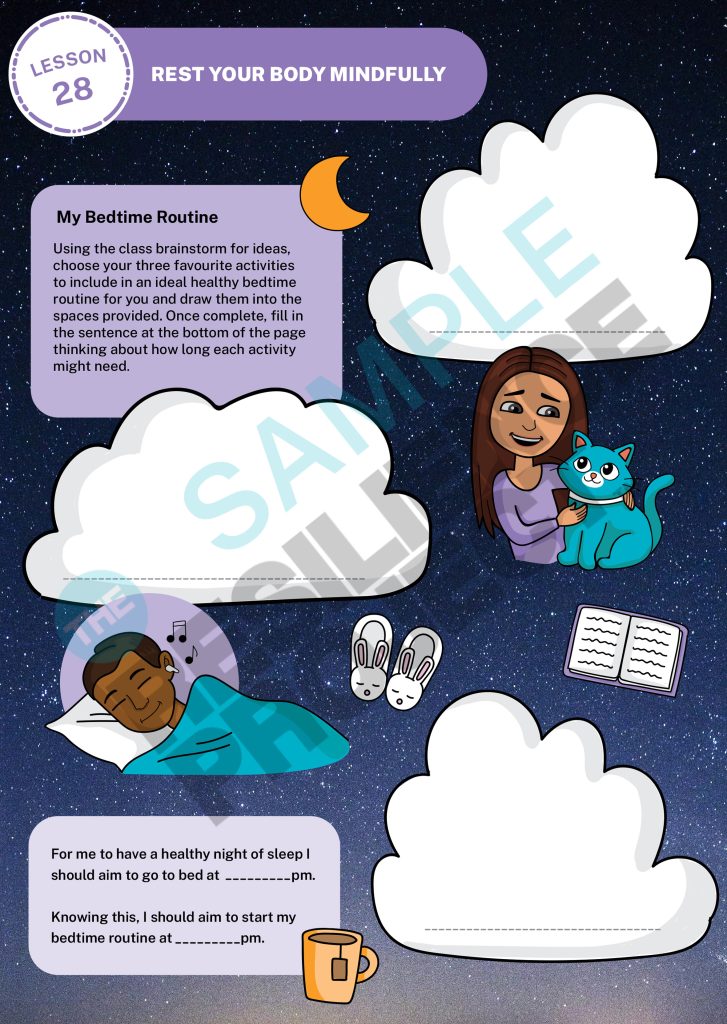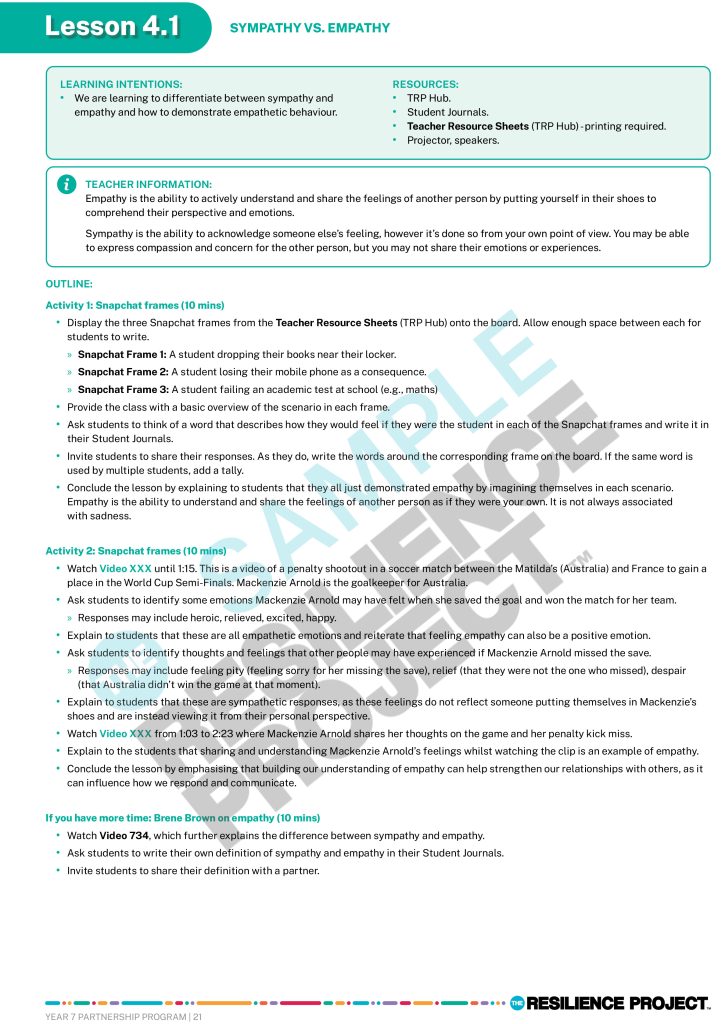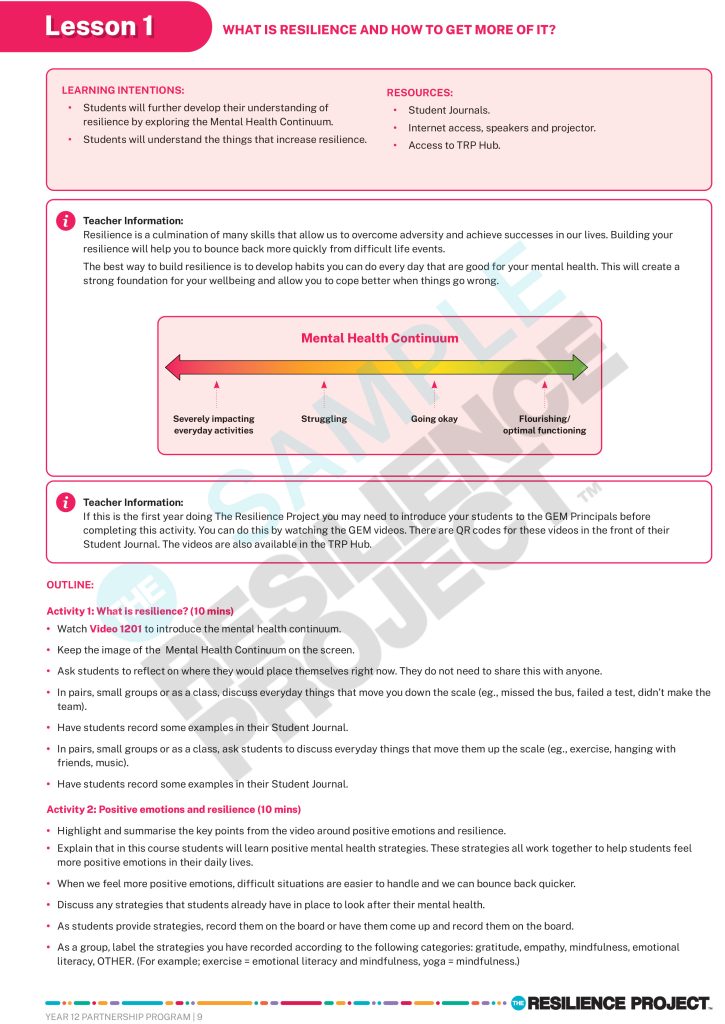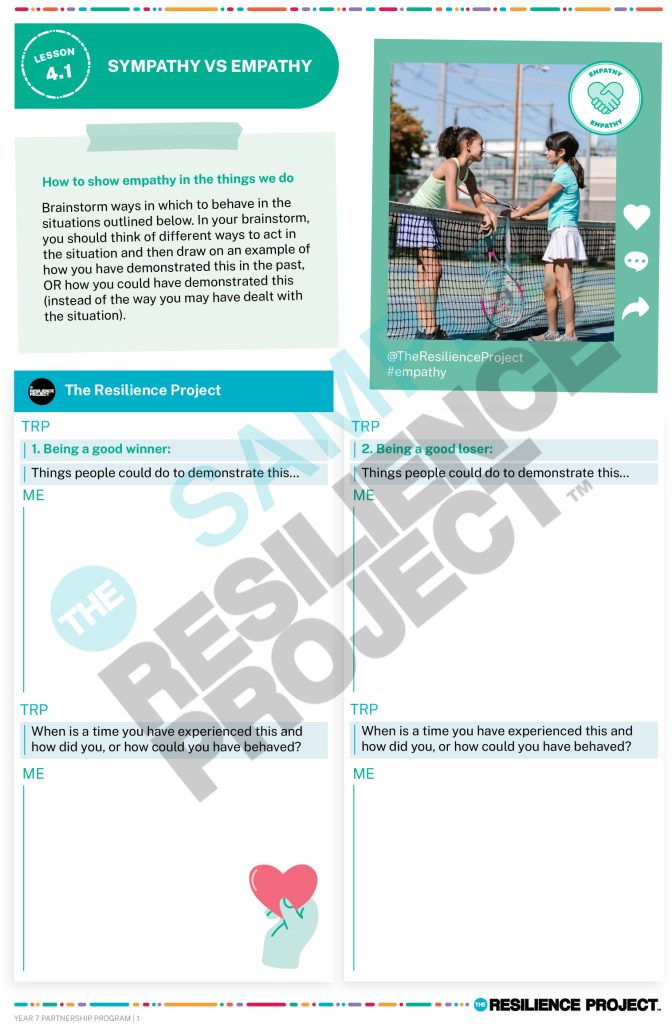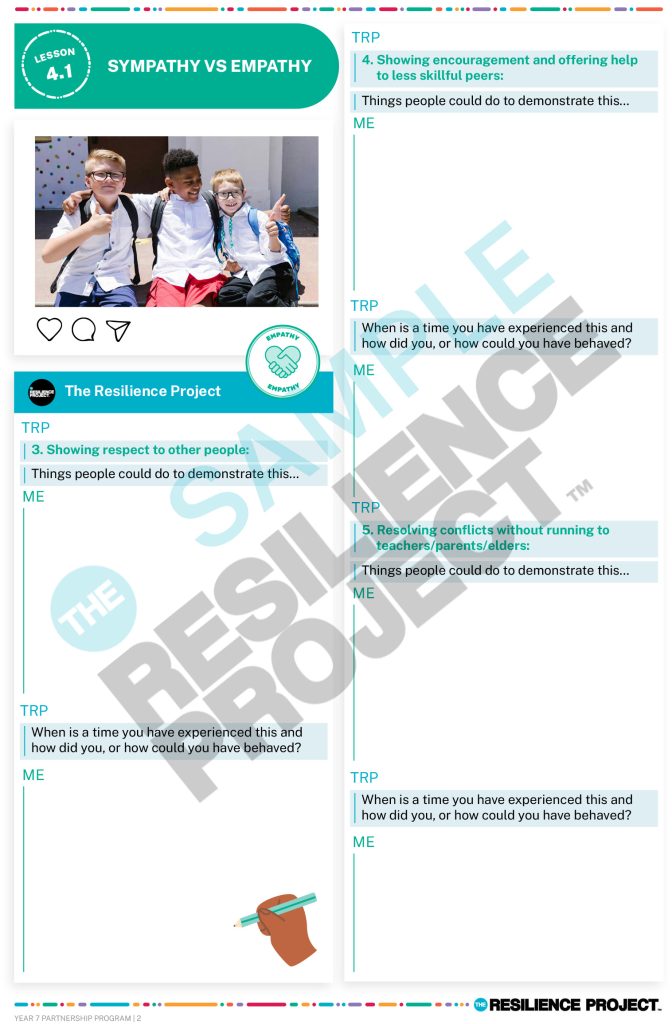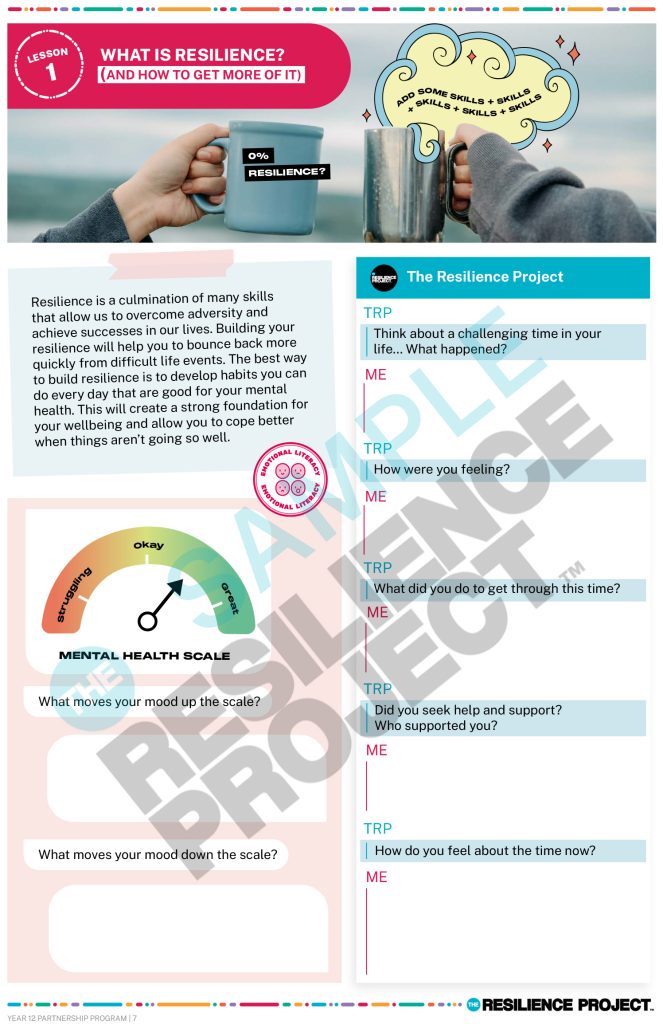2025 School Wellbeing Program
Our whole school wellbeing program teaches and supports positive mental health in the classroom, staffroom and wider community.
Our program is emotionally engaging, practical, proven to have impact through evidence based evaluations, and is delivered in 1000+ schools. Every school has their own dedicated partnership manager to support the successful implementation of the program.
We’re extremely proud to be a accredited program provided on a number of Department of Education funding initiatives. Click to learn more.
What's in our wellbeing program?

Digital Presentations & Staff PD
Age specific videos for students (F-12), a video series for parents and professional development for staff.
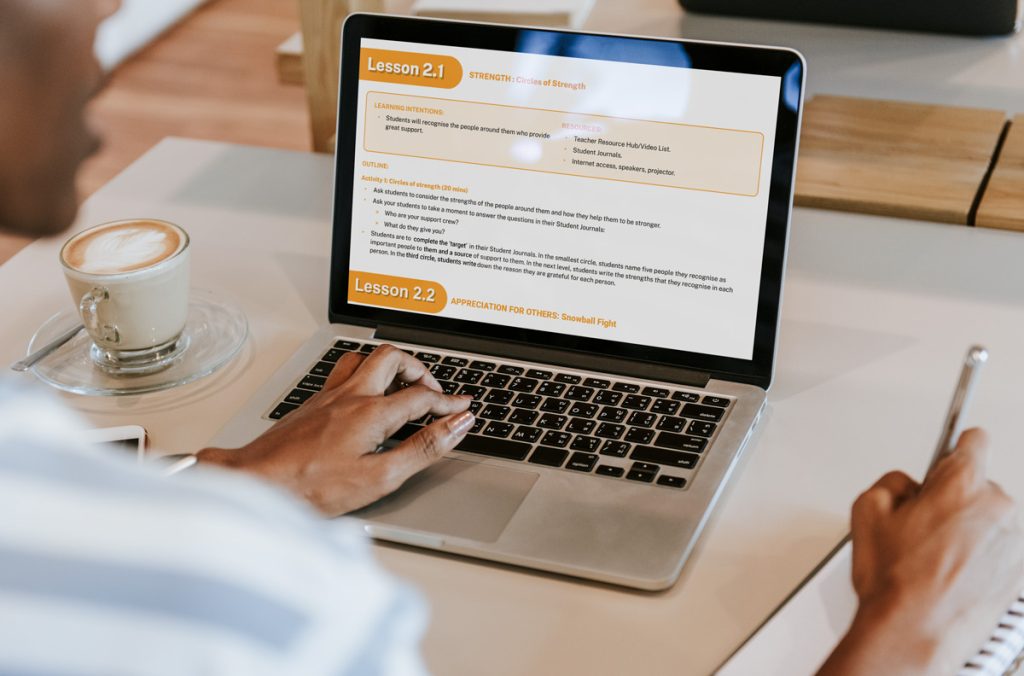
Teaching and learning curriculum
A year long program with lessons tailored to every year level, accessed via a dedicated online teaching hub, and individual student journals.
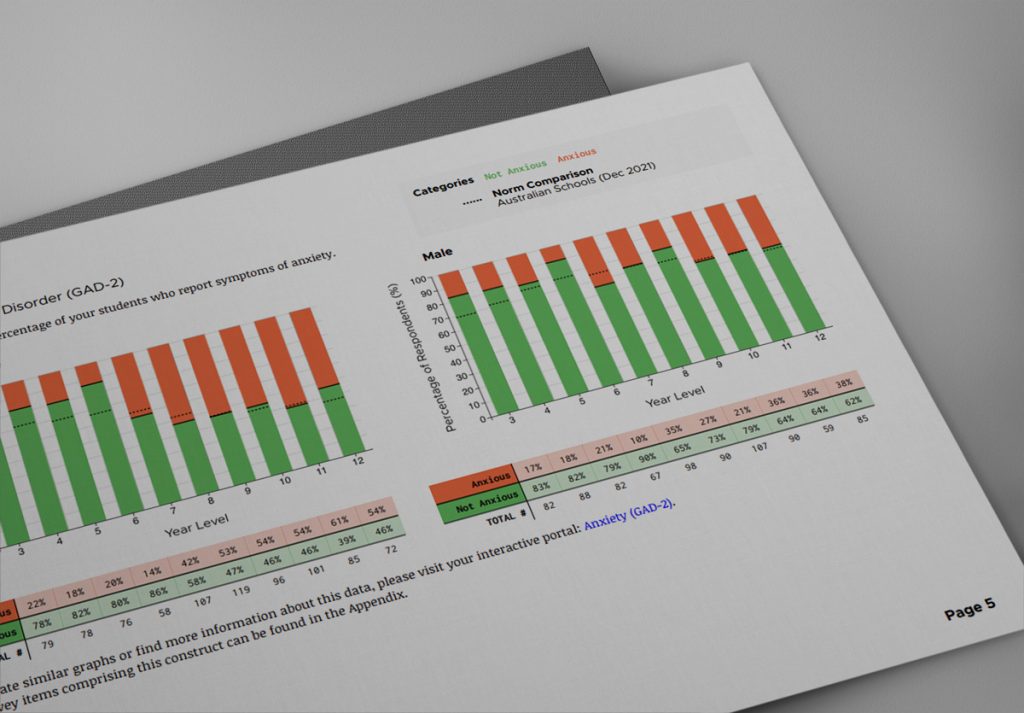
Wellbeing Survey and Analysis
An annual survey providing you with a benchmark to track the resilience of your students each year.

School Partnership Manager
A dedicated support teacher to provide year-round assistance, helping you implement the program in your specific school setting.
Jump to:
Primary Program
Primary Wellbeing Program
Developed by educators across Australia, our Primary Wellbeing Program is evidence-based and tailored to each year level to provide proven impact.
Centred on The Resilience Project’s core principles — Gratitude, Empathy, Mindfulness, and Emotional Literacy — each lesson has been comprehensively scripted with fun & engaging Student Journal activities and Teacher Resource Sheets, so that every teacher feels completely supported and confident in the material and delivering it.
Our program takes a whole school approach with materials for students, staff and parents, including professional development opportunities for teachers like; webinars, online courses, and a mini PD series. All resources are available on the TRP Hub, an interactive online platform with extensive classroom ideas, all lesson materials, classroom posters, and much more!
All of this can be further explained by your dedicated School Partnership Manager who is there to answer any questions and help implement the program to your specific school setting.
You can explore video samples, lesson plans, and student journal examples below.
Why it matters...
65%
of adolescents do not seek help.
70%
of primary school students are feeling moderate to low levels of hope.
1 in 4
primary students are experiencing high levels of anxiety, depression, or both.
65%
of adolescents do not seek help for mental illness.
70%
of primary school students are feeling moderate to low levels of hope.
1 in 4
primary students are experiencing high levels of anxiety, depression or both.
F-3 Sample Video
F-3 Sample Video
4-6 Sample Video
What others have to say about us...
Secondary Program
Secondary Wellbeing Program
Developed by educators across Australia, our Secondary Wellbeing Program is evidence-based and tailored to each year level to provide proven impact.
Centred on The Resilience Project’s core principles — Gratitude, Empathy, Mindfulness, and Emotional Literacy — each lesson contains fun & engaging Student Journal activities and Teacher Resource Sheets, that have been broken down into smaller activities to allow greater flexibility in how the program is implemented across busy secondary timetables.
Our program takes a whole school approach with materials for students, staff and parents, including professional development opportunities for teachers like; webinars, online courses, and a mini PD series. All resources are available on the TRP Hub, an interactive online platform with extensive classroom ideas, all lesson materials, classroom posters, and much more!
All of this can be further explained by your dedicated School Partnership Manager who is there to answer any questions and help implement the program to your specific school setting.
You can explore video samples, lesson plans, and student journal examples below.
Why it matters...
1 in 3
Secondary students are experiencing high levels of anxiety, depression, or both.
65%
of adolescents do not seek help for mental illness.
Over 50%
of students are at risk of a poor learning mindset (anxiety + disengagement).
Samples of our program
7-9 Sample Video
10-12 Sample Video
10-12 Sample Video
What others have to say about us...
Proven Impact
University of Adelaide
This study was an independent review of the schools that participated in The Resilience Project program from 2019-2021 (83,002 students) vs. those that did not participate (79,699 students). The study concluded that:
- TRP participants maintained consistent emotional wellbeing and life satisfaction in contrast to those that did not participate in the program.
- TRP participants experienced an increase in perceived support over the period from their peers and the wider school community. This differed to non TRP participants, who experienced a steady decline.
- TRP students exhibited consistent levels of healthy behaviours in comparison to those students who were not involved in the program.
University of Melbourne
From January-December 2019, an evaluation was conducted with six primary schools implementing the program and six schools that were not implementing the program. The evaluation involved student surveys, interviews and focus groups, as well as interviews with teachers and parents. The evaluation demonstrated evidence of:
- Increased confidence and self esteem in the children who participated in the program.
- Stronger relationships at school and home with the children who participated in the program.
- Increased knowledge and ability to express emotions in the children who participated in the program.
- More supportive classroom environments in the schools that participated in the program.
Who we're working with
Who we're working with...
We’re proudly working with 1000+ schools around the country as of 2024. Our goal is to teach resilience and support mental wellbeing to as many schools and communities as possible across rural, regional, and metro areas.
Program Inclusions
Both Inspire and Engage components are delivered together within the program
Inspire
Students
- Highly engaging, age-specific video content with supporting activities.
Teachers
- Inspiring video content to teach staff about the key principles of GEM.
- Teaching TRP Workshop.
- Live staff webinar with Hugh or Martin.
- Resilient Youth Staff Webinar.
Parents and Carers
- Suite of inspiring digital clips to provide a home to school connection.
- Discovering Resilience Webinar.
School
- Leading TRP introductory meeting.
- Welcome meeting.
- Resilient Youth Survey Results meeting.
Engage
Students
- Personal annual student wellbeing journal.
- Culturally inclusive learning activities and experiences.
- Participation in the Resilient Youth (RY) Survey.
Teachers
- Up to 30 teacher lesson plans for every year level.
- Lessons mapped against curriculum standards.
- Comprehensive online teacher hub.
- Culturally responsive designed curriculum.
Parents and Carers
- Dedicated online parent/carer hub with supporting resources.
- Parent communication, including: Parent/carer newsletter.
School
- Dedicated School Partnership Manager to provide ongoing program support.
- GEM Pack (digital classroom posters, display boards, student award certificates, PD.
2025 Program Cost Calculator
Program Cost = $3900 + $20 per student (+GST)
FAQs
Frequently Asked Questions
What is the intended impact of the program?
To inspire happiness and build resilience in school communities by implementing easy but effective strategies that are proven to increase mental wellbeing.
When should we roll out the Digital Teacher Presentation Clips?
We recommend rolling out the four presentation clips over the first four weeks of Term 1 or to watch them at one time, at the beginning of term. Your dedicated school partnership manager will meet with you this year to introduce your leadership team to the program and to help with how to best implement the program in your school.
What is the duration of the program and when does it start?
The program curriculum runs for approx 30 weeks and includes 30 tailored lessons that are specific to every year level.
In regards to the digital presentations it is suggested teachers watch these at the start of the school year and these can then be followed by the digital presentations for students in the first 4-5 weeks of Term 1. It is suggested the clips for parents are made available in late term 1 or early term 2.
Your school can commence teaching the program from Week 1 of Term 1 as all resources (journals and curriculum) will be delivered to your school at the end of Term 4 the previous year*. Your key leaders will be invited to a Welcome meeting run by your dedicated School Partnership Manager in Term 4 of the year prior to you commencing the program so you are confident and ready to implement the program in Term 1.
When is the Resilient Youth Survey conducted and what is its purpose?
While the survey is available from Term 1, we recommend rolling it out at the beginning of Term 2.our School Partnership Manager will unpack the data with you in Term 3.
How do the lessons run?
The curriculum includes 30 x 60 min unique lesson plans (primary) and 50 x 25 mins unique lessons plans (secondary) . Ideally, one lesson per week (per year level) is suggested across 30 weeks to cover the curriculum. However, flexibility exists in delivery methods, and your School Partnership Manager will assist in creating a suitable plan during your Welcome meeting as to how this could look on a week to week basis.
Running complete lessons is preferred, but if capacity is limited, specific activities within lessons can be chosen, as each activity has a suggested timeframe.
It’s encouraged for all year levels to participate in the TRP School Wellbeing Program rather than specific year groups, as it functions optimally as a whole-school approach.
What is the cost of the program?
For first year schools, the cost of a partnership program is a base fee of $3,900 + $20 per participating student. The student participation cost can be covered by the school or by placing it on your school’s booklist. Prices do not include GST.
What is the ongoing cost of the program?
We encourage every school to continue with both the Inspire and Engage elements each year.
Inspire and Engage: $3900 + $20 per student.
This provides the schools with the best structure to fully integrate GEM into your school culture and maximise program impact.
Alternatively, you can opt for just the Engage component ($20 per student) and we can assist you in making this decision closer to the time.
The continuing cost breakdown is as follows:
Inspire and Engage: $3900 + $20 per student
OR
Engage only (Teaching and Learning curriculum): $20 per participating student.
Schools can cover the student participation cost internally or by adding it to the school’s booklist, potentially resulting in no direct cost for the program in year two and beyond.
Additionally, schools can choose from a variety of presentations and digital resources to complement the program further.
Is the program listed on the Victorian Mental Health Fund?
Yes! You can find The Resilience Project under Tier 1: Positive Mental Health Promotion.
We’re also incredibly proud that our School Partnership Program ranks as a Level 3 in the ‘Strength of Evidence’ category thanks to the evidence-based nature of our teachings, and the independent evaluations completed by The University of Adelaide and The University of Melbourne.
We’re also incredibly proud that our School Partnership Program ranks as a Level 3 in the “Strength of Evidence” category thanks to the evidence-based nature of our teachings, and the independent evaluations completed by The University of Adelaide and The University of Melbourne.
Do we need to purchase the student journals?
It is essential for each student to have their own journal in order to complete the lessons and other additional activities. The cost of the journal is covered in the Engage fee per student.
Can our school run the program for 1 or 2 cohorts?
We encourage a whole school approach for primary schools but would be happy for 3 year levels to run the program in year 1.
We are open to this option at secondary level for schools with large enrolments. Please contact us at [email protected] to discuss.
Our school would like a live presentation, is this possible?
Your teaching staff will be invited to attend an online, live Discovering Resilience presentation with either Hugh van Cuylenburg or Martin Heppell as the presenter, which will take place in Term 3, 2024.
This live presentation will be complemented by the pre-recorded digital presentations for both your students and parent community.
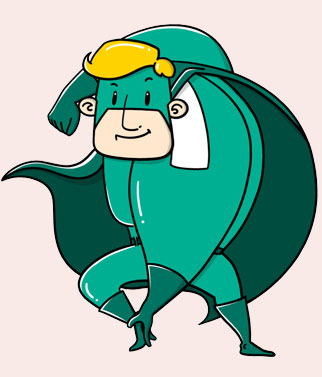
Sign me up!
Ready to start your journey?
We have a range of information sessions designed to answer all of your questions. Run by our in-house TRP gurus, the sessions have been divided into Primary, Secondary & F-12, to ensure you’re getting information for the year levels that are relevant to your school. Have a look for a time and cohort that suits you and register by using the button below!
Alternatively, if you’re ready to speak to one of our representatives about signing up, fill out the enquiry form using the button below.
Attend an online Information Session:
Foundation - Year 6
- 18/06/2410:00am
- 23/07/244:00pm
- 06/08/2410:00am
- 03/09/2410:00am
- 04/09/244:00pm
- 10/10/2410:00am
- 22/10/244:00pm
- 06/11/242:00pm
Year 7 - 12
- 18/06/24 10:00am
- 24/07/24 4:00pm
- 06/08/24 10:00am
- 04/09/24 4:00pm
- 10/10/24 10:00am
- 22/10/24 4:00pm
- 06/11/24 2:00pm
Foundation - Year 12
- 31/07/24 4:00pm
- 03/09/24 2:00pm
- 17/10/24 2:00pm
- 28/11/24 2:00pm
To view information session times, select your year levels from the options below
Foundation - Year 6
- 18/06/2410:00am
- 23/07/244:00pm
- 06/08/2410:00am
- 03/09/2410:00am
- 04/09/244:00pm
- 10/10/2410:00am
- 22/10/244:00pm
- 06/11/242:00pm
Year 7 - Year 12
- 18/06/24 10:00am
- 24/07/24 4:00pm
- 06/08/24 10:00am
- 04/09/24 4:00pm
- 10/10/24 10:00am
- 22/10/24 4:00pm
- 06/11/24 2:00pm
Foundation - Year 12
- 31/07/24 4:00pm
- 03/09/24 2:00pm
- 17/10/24 2:00pm
- 28/11/24 2:00pm


